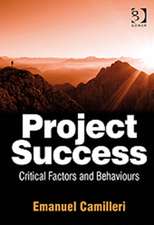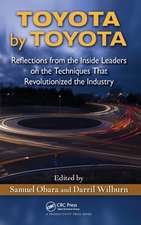Path Dependence and Creation: Organization and Management Series
Editat de Raghu Garud, Peter Karnoeen Limba Engleză Paperback – 16 aug 2012
This book is compiled of both theoretical and empirical writings. It shows relatively well-known industries, such as the automobile, biotechnology, and semi-conductor industries in a new light. It also invites the reader to learn more about medical practices, wind power, lasers, and synthesizers.
Primarily written for academicians, researchers, and Ph.D. students in fields related to technology management, this book is research-oriented and will appeal to all managers.
| Toate formatele și edițiile | Preț | Express |
|---|---|---|
| Paperback (1) | 494.87 lei 6-8 săpt. | |
| Taylor & Francis – 16 aug 2012 | 494.87 lei 6-8 săpt. | |
| Hardback (1) | 1014.33 lei 6-8 săpt. | |
| Taylor & Francis – feb 2001 | 1014.33 lei 6-8 săpt. |
Din seria Organization and Management Series
-
 Preț: 373.11 lei
Preț: 373.11 lei - 23%
 Preț: 327.97 lei
Preț: 327.97 lei -
 Preț: 405.06 lei
Preț: 405.06 lei - 15%
 Preț: 498.46 lei
Preț: 498.46 lei - 15%
 Preț: 503.19 lei
Preț: 503.19 lei - 22%
 Preț: 324.59 lei
Preț: 324.59 lei -
 Preț: 500.82 lei
Preț: 500.82 lei -
 Preț: 454.22 lei
Preț: 454.22 lei - 16%
 Preț: 168.81 lei
Preț: 168.81 lei -
 Preț: 492.96 lei
Preț: 492.96 lei - 16%
 Preț: 299.52 lei
Preț: 299.52 lei - 15%
 Preț: 449.05 lei
Preț: 449.05 lei -
 Preț: 487.75 lei
Preț: 487.75 lei -
 Preț: 200.10 lei
Preț: 200.10 lei -
 Preț: 413.55 lei
Preț: 413.55 lei - 15%
 Preț: 433.41 lei
Preț: 433.41 lei - 25%
 Preț: 326.89 lei
Preț: 326.89 lei - 18%
 Preț: 1001.07 lei
Preț: 1001.07 lei -
 Preț: 487.79 lei
Preț: 487.79 lei -
 Preț: 485.24 lei
Preț: 485.24 lei - 18%
 Preț: 1123.37 lei
Preț: 1123.37 lei -
 Preț: 482.57 lei
Preț: 482.57 lei -
 Preț: 490.83 lei
Preț: 490.83 lei -
 Preț: 361.08 lei
Preț: 361.08 lei - 24%
 Preț: 322.92 lei
Preț: 322.92 lei -
 Preț: 416.44 lei
Preț: 416.44 lei - 15%
 Preț: 426.88 lei
Preț: 426.88 lei -
 Preț: 484.47 lei
Preț: 484.47 lei -
 Preț: 486.21 lei
Preț: 486.21 lei - 18%
 Preț: 1116.77 lei
Preț: 1116.77 lei -
 Preț: 434.25 lei
Preț: 434.25 lei - 15%
 Preț: 423.89 lei
Preț: 423.89 lei -
 Preț: 477.94 lei
Preț: 477.94 lei - 15%
 Preț: 434.99 lei
Preț: 434.99 lei
Preț: 494.87 lei
Nou
Puncte Express: 742
Preț estimativ în valută:
94.70€ • 102.84$ • 79.55£
94.70€ • 102.84$ • 79.55£
Carte tipărită la comandă
Livrare economică 22 aprilie-06 mai
Preluare comenzi: 021 569.72.76
Specificații
ISBN-13: 9780415650717
ISBN-10: 0415650712
Pagini: 440
Dimensiuni: 152 x 229 x 27 mm
Greutate: 0.59 kg
Ediția:1
Editura: Taylor & Francis
Colecția Psychology Press
Seria Organization and Management Series
Locul publicării:Oxford, United Kingdom
ISBN-10: 0415650712
Pagini: 440
Dimensiuni: 152 x 229 x 27 mm
Greutate: 0.59 kg
Ediția:1
Editura: Taylor & Francis
Colecția Psychology Press
Seria Organization and Management Series
Locul publicării:Oxford, United Kingdom
Public țintă
ProfessionalCuprins
Contents: A.P. Brief, J.P. Walsh, Series Editors' Foreword. Preface. R. Garud, P. Karnøe, Path Creation as a Process of Mindful Deviation. Part I:Path Dependence and Beyond. A.P. Bassanini, G. Dosi, When and How Chance and Human Will Can Twist the Arms of Clio: An Essay on Path Dependence in a World of Irreversibilities. P.M. Hirsch, J.J. Gillespie, Unpacking Path Dependence: Differential Valuations Accorded History Across Disciplines. V.W. Ruttan, Sources of Technical Change: Induced Innovation, Evolutionary Theory, and Path Dependence. Part II:From Path Dependence to Path Creation. M. Kenney, U. von Burg, Paths and Regions: The Creation and Growth of Silicon Valley. R.N. Langlois, D.A. Savage, Standards, Modularity, and Innovation: The Case of Medical Practice. J.A.C. Baum, B.S. Silverman, Complexity, Attractors, and Path Dependence and Creation in Technological Evolution. Part III:Path Creation as Co-Evolution. J.F. Porac, J.A. Rosa, J. Spanjol, M.S. Saxon, America's Family Vehicle: Path Creation in the U.S. Minivan Market. H. Rao, J. Singh, The Construction of New Paths: Institution-Building Activity in the Early Automobile and Biotech Industries. R. Kemp, A. Rip, J. Schot, Constructing Transition Paths Through the Management of Niches. Part IV:Path Creation as Mobilization. J. Lampel, Show-and-Tell: Product Demonstrations and Path Creation of Technological Change. B. Van Looy, K. Debackere, R. Bouwen, Innovation as a Community-Spanning Process: Looking for Interaction Strategies to Handle Path Dependency. J. Mouritsen, N. Dechow, Technologies of Managing and the Mobilization of Paths. T. Pinch, Why Do You Go to a Piano Store to Buy a Synthesizer?: Path Dependence and the Social Construction of Technology.
Recenzii
"Individually, each chapter is informative and well worth reading....Garud and Karnoe deliver a set of papers that are each individually interesting and nicely crafted, rendering the volume as a whole both useful and provocative....the volume will make a nice addition to individual scholars' bookshelves and institutions' libraries..."
—Administrative Science Quarterly
—Administrative Science Quarterly
Descriere
The objective of this book is to offer a framework to explore issues pertaining to path dependence and creation which seek to understand the generative forces driving phenomena. How do technologies emerge?













